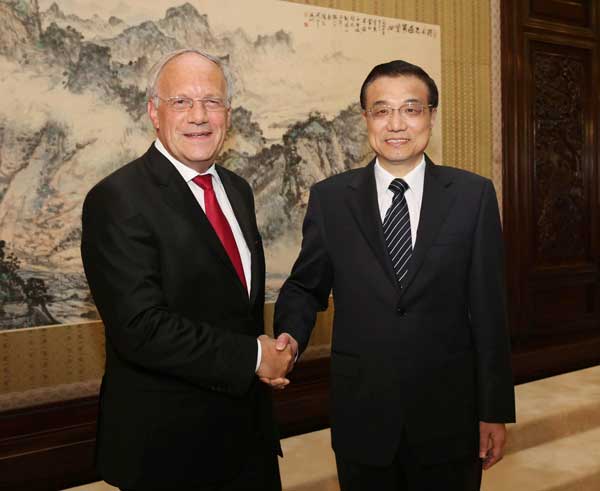China-Switzerland FTA a strong signal against protectionism
Updated: 2013-07-07 00:23
(Xinhua)
|
|||||||||||
BEIJING - A just-signed free trade agreement (FTA) between China and Switzerland sent the world a strong signal against trade protectionism and will serve as a positive example for China-Europe cooperation, Premier Li Keqiang said Saturday.
The FTA, the first of this kind inked between China and a country in continental Europe, is a milestone in the China-Switzerland relations, Li said during his meeting with Swiss Federal Councillor Johann Schneider-Ammann.
 |
|
Chinese Premier Li Keqiang (R) meets with Johann Schneider-Ammann, Swiss Federal Councilor and head of the Swiss Federal Department of Economic Affairs, in Beijing, capital of China, July 6, 2013. [Photo/Xinhua] |
Schneider-Ammann and Chinese Commerce Minister Gao Hucheng signed the trade pact Saturday in Beijing, after over two years of negotiations and legal processes.
Li said advancing freedom and convenience in trade and investment could be "a good remedy" for the difficult recovery of the global economy.
He said China supports a multi-lateral trade system and believes that the trade between countries and regions as well as multi-lateral trade are equally important.
China is willing to work with all related parties to achieve progress in Doha round negotiations and help stabilize and revive world economy, he said.
Schneider-Ammann, also head of the Swiss Federal Department of Economic Affairs, said the signing of the FTA is a historic moment.
He said Switzerland will grasp opportunities arising from the pact to upgrade the cooperation of the two countries.
China is Switzerland's largest trading partner in Asia, while Switzerland is China's eighth-largest trading partner in Europe, according to official Chinese data.
Once the FTA goes into effect, as much as 99.7 percent of Chinese exports to Switzerland will be immediately exempted from tariffs, while 84.2 percent of Swiss exports to China will eventually receive zero tariff.
The deal is also expected to facilitate industrial cooperation between both countries and set new rules in the areas of environment, labor, intellectual property and government procurement.
Related Stories
What China-Switzerland FTA brings about? 2013-05-25 17:38
China, Switzerland ink free trade agreement 2013-07-06 12:04
FTA helps treble NZ exports to China: Yearbook 2013-07-04 14:06
Premier promotes creation of FTA with EU 2013-06-29 07:41
Australia missing out on China FTA 2013-06-21 16:31
FTA will help ease tensions 2013-06-19 07:44
Today's Top News
Train derails in southwest Russia, 7 injured
Testing fresh ground for clean tech development
Boeing 777 passenger 'mumbled a prayer'
Job seekers should be cautious abroad
Ex-minister gets suspended death
River pollution sparks criticism
Chinese workers return after dispute
Terror attack was planned: suspect
Hot Topics
Lunar probe , China growth forecasts, Emission rules get tougher, China seen through 'colored lens', International board,
Editor's Picks

|

|

|

|

|

|





